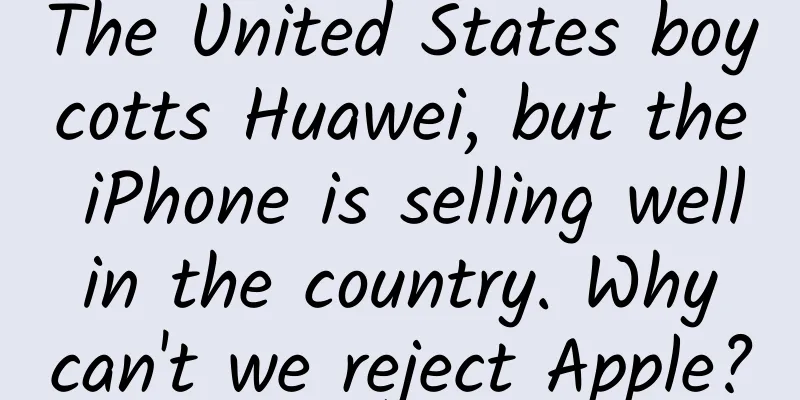The United States boycotts Huawei, but the iPhone is selling well in the country. Why can't we reject Apple?

|
Now we finally have Huawei that can compete with Apple, but everyone has seen Huawei's current development. Because of its rapid development, it threatens the interests of countries led by the United States. In the past two years, Huawei has been suppressed. Although Huawei started out in communications, its mobile phone business has now accounted for half of its market share. The United States is well aware of this. In addition to suppressing Huawei's sales channels, it is also trying to cut off all sources of Huawei's technology and components. Among them, the chip supply cut-off is the biggest blow to Huawei. The chip supply cut directly restricted the development of Huawei's mobile phone business. Not only did the United States stop supplying chips to Huawei, the production lines of foundries such as TSMC were also unable to manufacture chips for Huawei because they contained some American technology. In the end, Huawei had no choice but to spin off Honor. In the face of suppression, Huawei once said: "Without scars, how can one become tough and thick-skinned? Heroes have suffered many hardships since ancient times." But in reality, Huawei ultimately succumbed to reality. Last week, market research firm Counterpoint released a report showing that in October this year, iPhone sales in the Chinese market increased by 46% month-on-month, taking a 22% market share. This is the second time that Apple has become the largest smartphone manufacturer in the Chinese market since December 2015. As can be seen from the figure below, Huawei's market share has dropped to 8%, and most of the market share has been taken away by Apple. Obviously, while Huawei is being suppressed, Apple has not only not been banned from sales, but its sales are getting better and better. Many people will ask: Why can the United States boycott Huawei, but we Chinese cannot reject Apple? There are many reasons behind this. First, Apple continues to cater to the needs of the Chinese people, and its “low-price strategy” has been proven to be effective. In fact, in the few years after 2015, Apple's development in the Chinese market fell into a slump. There were several important reasons for this. One of them was that it ignored the localization needs of the Chinese market. It did not cater to the Chinese market in terms of hardware or software. For example, many of our Chinese people have two mobile phone numbers, so they need dual SIM cards and dual standby. After Apple's sales declined, Apple began to take it seriously and launched dual-SIM dual-standby mobile phones in 2018, snatching away a group of Android users. In terms of price, Cook is still very smart. He adopts a low-price strategy for China to increase the purchasing desire of Chinese consumers. According to statistics, iPhone 13 sales in October this year reached 6.5 million units, a year-on-year increase of 155%. Overall, the iPhone 13 series has not changed much compared to previous generations, but the initial price is cheaper than the previous generation. This is the reason why Chinese people are buying it crazily, and it also indirectly reflects the Chinese consumers' recognition of Apple phones. It can be seen that no matter what the outside world says, no matter how loud the slogans on the Internet are, once the price of Apple mobile phones drops, many people still can't resist the temptation to spend money to buy them. They say they won't buy, but their actions are honest. This is human nature! Second, the prices of domestic Android flagships are getting higher and higher, but their performance is not satisfactory. Among high-end models, Apple phones are still the first choice. Major domestic manufacturers are always immersed in their own world, thinking that by piling up some hardware and lowering prices, they can impact the domestic high-end smartphone market, but the results are not satisfactory. At present, the prices of domestic high-end mobile phones are getting more and more expensive, but the system is not as smooth as Apple's, and the experience is not as good as Apple's mobile phones. The gap in performance is even greater, and more people will choose Apple mobile phones. Thanks to the A-series bionic processor and iOS system, the service life of Apple phones far exceeds that of Android phones, and the overall cost-effectiveness is still the highest. It will be difficult for other manufacturers in the industry to catch up with Apple in the next two years. This means that users of flagship products will be further attracted to Apple, and domestic mobile phones can only take up the low- and mid-end market vacated by Huawei. Overall, the growth rate of China's smartphone market has slowed down slightly this year, but Apple's growth is a positive signal, which fully demonstrates that Chinese smartphone users are maturing rapidly and want to buy more high-end devices. For Apple, this is a good development opportunity. Third, Apple creates a large number of jobs in our country. China not only has the world's largest consumer market, but also has a large number of labor resources. Therefore, China has become the world's largest OEM factory for Apple mobile phones. In fact, if you dig deeper into Apple’s manufacturing, you will find that although Apple is an American brand, most of its production comes from my country. We can understand Apple as a "mobile phone assembled in China with an American brand." According to statistics, Apple has created 5 million jobs in China, including contract manufacturers such as Foxconn, and provided these workers with very considerable income. Of course, this does not include some other scattered industries, such as mobile phone film. In addition, many of the APP developers in Apple's APP Store are from China. Therefore, if we boycott Apple or ban the sale of Apple products, many people will lose their jobs, which is a huge loss. In short, Huawei is dispensable to the United States, and Huawei's market is not in the United States. But for China, Apple is too important. Although restricting Apple's development in China will have a certain impact on Apple, the impact on China will be even greater, which is not a good thing. Only cooperation can lead to win-win results. China will always adhere to openness and inclusiveness, which is one of the reasons why many world-class companies have taken root in China. The arrival of Apple has promoted the development of the Chinese mobile phone market, and we should also learn something from it. Why Apple can succeed is that it relies on technological innovation to gain market share. This gives domestic mobile phones an inspiration that they must work hard on core technologies, increase R&D investment, and drive development through innovation. This is also what Huawei has always insisted on doing. Although Huawei is still in trouble, we firmly believe that as long as we persist, we will be able to break through and usher in the dawn! |
<<: How to solve the problem of inexplicable APP login on iOS 15
Recommend
Operational promotion: How to increase active users?
Having a growing pool of active users is the ulti...
Promotional Marketing: A brief discussion on vlog’s brand marketing and traffic monetization!
With the vigorous development of the Internet sho...
Is the popular sleep aid “white noise” fake science or real scam?
"My eyes were as big as bells, and I tossed ...
Is it better to exercise in the morning or in the evening? The latest research shows that this time is the "optimal solution"!
The latest research shows that exercising in the ...
Top physicists will discuss the future of quantum at the birthplace of quantum mechanics
2025 was declared the "International Year of...
The correct way to enjoy the moon during the Mid-Autumn Festival: Check out the Chinese elements on the moon
Produced by: Science Popularization China Produce...
WeChat launches "Transportation Card", which can integrate 136 cities' ride codes and is already in grayscale testing
Recently, the "Transportation Card" ser...
Wait a little longer, the domestically produced Tesla Model 3, which is priced at 320,000 yuan, still has a huge room for price reduction
Finally, Tesla announced the price of the Model 3...
How much does it cost to attract investment in Lanzhou Entertainment Mini Program? What is the investment price for Lanzhou Entertainment Mini Program?
Starting a business requires costs, and mini prog...
How to write an excellent marketing creative plan?
When it comes to creativity, it is difficult for ...
One third of the liver was "eaten", and the murderer was actually a "fish"?
According to Guilin Evening News, Ms. Feng from Q...
Do you think metals are all silvery white? Wrong! In fact, they are all black!
Since the late 20th century, society has entered ...
【Smart Farmers】Ancient and magical single cells - protozoa in aquaculture environments
Take a drop of water from the breeding pond, it l...
1688 Alibaba TrustPass Operation. From Beginner to Master
Learn to master: Understand the positioning of 16...
Do you know these 4 points about Tencent social advertising?
Do you know all this about Tencent social adverti...









